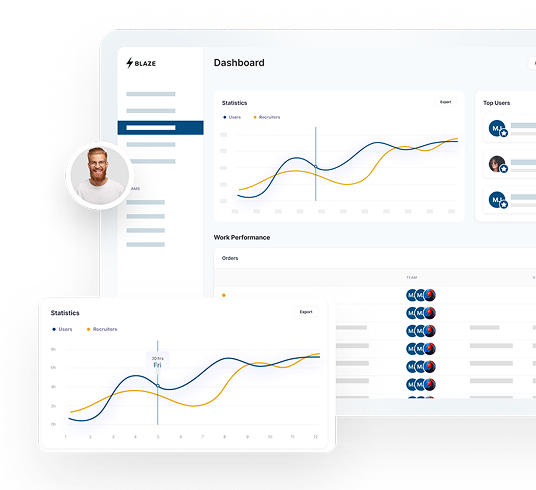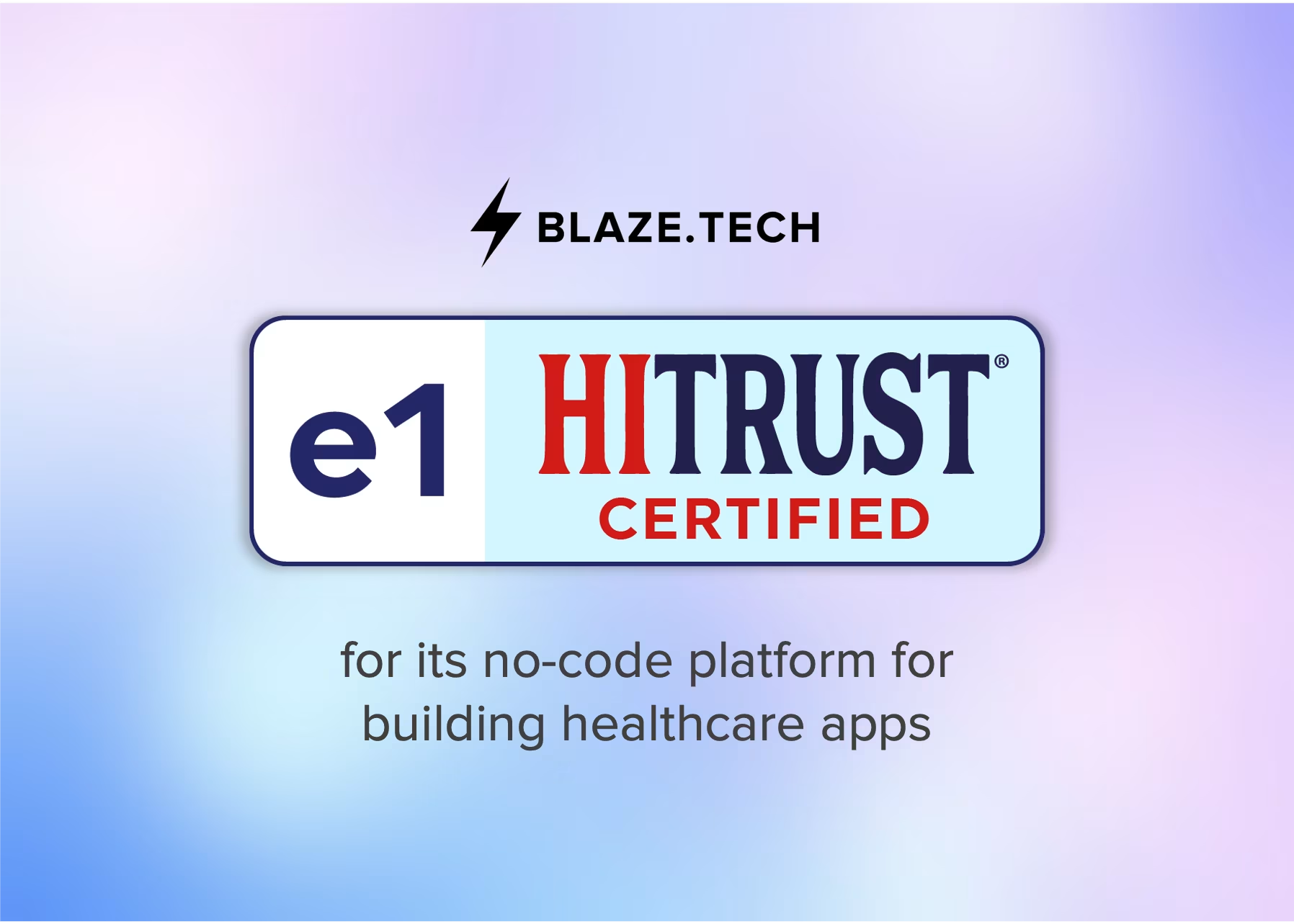Table of contents
Appsmith Review (2026): Pros, Cons & Is It Worth It?

Written by
Blaze Team

Reviewed by
Justyna Wojcik
Expert Verified
Are you looking for an app-building tool to help you quickly create business tools? You might have stumbled across Appsmith and wondered if it’s right for you.
Whether you’re looking to create a sleek sales dashboard, a robust customer support portal, or a handy internal tool for your team, choosing the right platform is crucial.
This Appsmith review will help you decide if it’s the right tool. We’ve compiled one of the most comprehensive reviews, including its features, pros and cons, and how it compares with other popular tools.
Let’s get started.
What is Appsmith?

Appsmith is an open-source platform designed to help developers build powerful internal apps that can connect to multiple data sources.
Whether you need a customer support portal, a sales dashboard, a marketing tracker, or an admin panel, Appsmith lets you create these applications quickly and efficiently.
Appsmith offers many powerful features that are out of the box. You can connect your Git hosting provider to Appsmith to restrict access, manage versions, and ensure process compliance. For secure authentication and authorization, you can use Google and GitHub OAuth, SAML, or OIDC from popular providers.
Additionally, Appsmith provides granular access controls, allowing you to configure access by roles and groups for every entity, action, app, workspace, and instance, ensuring precise control for teams.
Features
- AI actions: Add advanced capabilities to your apps by seamlessly connecting to LLMs from OpenAI, Google AI, Anthropic, and more. Integrate pre-built AI actions like text analysis, image classification, and semantic search to enhance your applications.
- Open-source: Appsmith is free to use, making it an excellent choice for budget-conscious organizations. You can download and start using it without any upfront costs.
- Community support: Appsmith has a strong community support system, including forums, documentation, and tutorials. This community-driven support can be a valuable resource for troubleshooting and finding solutions.
- Wide integration options: With over 40 native integrations and the ability to add resources via REST APIs, you can easily connect Appsmith to your existing systems. The cURL importer feature lets you input cURL commands directly into your application.
- Intuitive integrated development environment: Appsmith offers around 50 different out-of-the-box app components that you can drag and drop on the canvas with an intuitive interface. You can specify properties and attributes via code written in JS escape hatches or by selecting properties from dropdowns provided by Appsmith’s pre-built CRUD.
- Source control with Git: Appsmith supports source control through Git out-of-the-box. Developers can set up a traditional Git workflow and manage features and releases in their preferred Git provider.
Pros
- Open-source: Appsmith is open-source, meaning developers can customize and benefit from community contributions. It’s free and continuously improved by a collaborative community.
- Multiple data source compatibility: Appsmith ensures easy integration with your existing data services. You can connect to various data sources, including SQL, NoSQL, RESTful, and GraphQL APIs.
- Great for teamwork: Appsmith’s features let multiple developers work on different parts of an app simultaneously, speeding up the development process.
- JavaScript customization: You can add custom functionality using JavaScript. While easy for non-developers, it also offers developers the power to implement complex logic.
- Ready-to-use widgets: Appsmith saves you time with various pre-built widgets, from text boxes to complex charts, that you can quickly add to your app’s UI.
Cons
- Self-hosting challenges: Setting up Appsmith’s self-hosted option can be tough without technical expertise. It might require additional resources or external help.
- Performance issues: Users have reported performance bottlenecks with large datasets or complex apps, which can slow development and require optimization.
- Limited built-in connectors: Appsmith supports many data sources, and its library of native connectors is continually expanding. Users might still need to create custom connectors for less common sources, but the platform offers robust support through REST APIs.
- Responsiveness concerns: Making your app fully responsive across all devices can be tricky. You might need extra effort to ensure a good user experience.
- Steep learning curve: New users may initially find Appsmith's advanced features challenging. However, the platform offers extensive documentation, tutorials, and community support to help users get up to speed quickly.
- Workflow refinement needed: Some users find Appsmith’s workflow less smooth than other platforms, which could impact productivity.
Pricing
- Free tier: Appsmith includes a free tier with unlimited users and basic features, perfect for individual developers and small teams.
- Business tier: The business tier is $40 per month for 100 hours of usage and includes more advanced features such as granular access controls, custom branding, and priority support.
- Enterprise tier: For more security and scale, Appsmith offers an enterprise tier with features like continuous delivery, custom integrations, and managed hosting.
However, you should review the current Appsmith pricing details because costs can increase if your usage scales, especially for larger teams. You’ll need to contact their sales team for pricing information for this tier.
What Kinds of Apps Can Appsmith Build?
Appsmith is designed for engineers to build internal business tools quickly. It's not limited to a single type of application. Here’s a look at what you can create with Appsmith:
- Enterprise dashboards: Build real-time dashboards that pull data from multiple sources, helping businesses make quick, informed decisions.
- CRUD applications: Easily create apps that manage Create, Read, Update, and Delete (CRUD) operations, perfect for handling databases and content.
- Third-party API integrations: Connect with third-party APIs to bring in data or send it out, making your applications more interactive and useful.
- Internal tools: Develop custom tools tailored to your team’s needs, boosting productivity and streamlining operations.
- Custom plugins and widgets: Use Appsmith’s open-source nature to create unique plugins and widgets, extending the platform’s functionality to meet your specific needs.
Who is Appsmith Good For?
- Startups and small businesses: Ideal for those with limited budgets who need a robust platform without the high costs associated with commercial software.
- Tech-savvy teams: Organizations with technical expertise that can leverage Appsmith's open-source nature to customize and extend its functionality.
- Developers: Individual developers looking for a cost-effective tool to build internal applications quickly.
Who Should Avoid Appsmith?
While Appsmith is a powerful tool, it might not be the right fit for everyone. Here are some scenarios where you might want to consider other options:
- Non-technical users: If you don’t have a technical background or a team of developers, Appsmith can be challenging to use. Its flexibility and open-source nature require a certain level of coding knowledge to leverage its capabilities fully.
- Small teams with limited resources: Setting up and maintaining Appsmith, especially the self-hosted version, also needs significant technical expertise and resources.
- Users that want to build native mobile apps: Appsmith primarily focuses on web applications. If your main goal is to develop native mobile apps for platforms like the Apple App Store or Google Play Store, you’ll need to look for other tools specialized in mobile app development.
- Performance-sensitive applications: For highly complex applications requiring extensive customization and optimization, Appsmith might not always deliver the best performance.
- Those requiring extensive built-in connectors: While Appsmith supports many data sources, its library of native connectors isn’t exhaustive. If your project relies on less common data sources, the need to create custom connectors could add to the development time.
- HIPAA-compliant applications: If your application needs to comply with HIPAA security standards, Appsmith might not be the best choice. Ensuring HIPAA compliance requires rigorous security measures that might be challenging to implement and maintain with Appsmith.
Appsmith Alternatives
- Blaze.tech: Blaze is a powerful no-code platform designed to build complex, custom applications without coding. It offers enterprise security, is SOC 2 certified, and is HIPAA compliant, making it a reliable choice for industries with stringent security requirements.
Blaze focuses on speed, allowing you to launch applications quickly while providing many integrations, advanced workflow automation, and a rich collection of widgets. - Retool: Retool is great for creating internal tools and prioritizes quick application assembly and deployment. Like Appsmith, it’s a low-code tool that allows developers to create apps that integrate with various data sources quickly.
Retool’s strengths lie in its pre-built components and connectors, which help speed the development process. - Budibase: Budibase is another excellent alternative for quickly building internal tools and business applications. It supports a range of data sources and provides a simple, intuitive interface for designing and deploying applications.
Like Appsmith, its open-source nature allows for extensive customization and community-driven enhancements, making it a versatile option for many use cases.
Is Appsmith HIPAA-Compliant?
HIPAA compliance is non-negotiable if you're in the healthcare sector or dealing with sensitive health information.
Unfortunately, Appsmith is not HIPAA-compliant out of the box.
However, for those needing HIPAA compliance or complete control over data storage and transmission, you must self-host Appsmith within your Virtual Private Cloud (VPC) and implement all necessary security measures.
This complex process requires significant technical expertise to meet all HIPAA requirements.
The Bottom Line
As the Appsmith reviews say, it’s a cost-effective and flexible app builder, particularly well-suited for small teams and those with coding expertise. It also allows for extensive customizability, allowing developers to tailor the platform to their needs.
This flexibility can be a significant advantage for those who require a highly customized solution without incurring the costs associated with proprietary software.
But Appsmith does come with some trade-offs. While it offers a robust set of features, it may not provide the same level of user-friendliness or out-of-the-box functionality as some other low-code or no-code platforms.
Setting up and maintaining Appsmith, especially the self-hosted version, can require significant technical expertise and resources.
For developers and technical teams looking to build internal applications quickly and affordably, Appsmith is a compelling choice. However, if you need to build customer-facing applications or need more advanced security features — we recommend trying Blaze.tech.
Blaze provides a user-friendly, no-code platform that combines speed, security, and functionality to help you bring your ideas to life.
Some key advantages of Blaze:
- Ease of use: Intuitive drag-and-drop interface allows for quick and easy application development, even for non-technical users
- Built-in database: Simplified data management eliminates the need for external databases, streamlining the development process
- Customizable workflows: Automates complex business processes with Blaze's workflow builder, tailored to your needs
- Comprehensive support: Blaze comes with the support of an implementation team that helps build the initial version of your application, speeding up your development cycle
Blaze is ideal for healthcare organizations, large enterprises, and startups looking for a secure, scalable, and easy-to-use platform for developing their applications — no technical background is needed.
The Secure No-Code & AI Platform
Supercharge your team's operations and performance with better apps and tools.
Create custom apps fast
Secure & HIPAA compliant
Streamline complex workflows

The Secure No-Code Platform
Build apps with best-in-class security.


